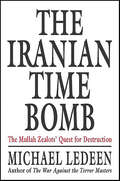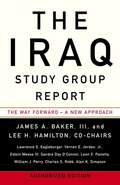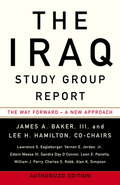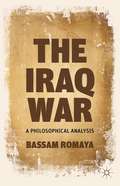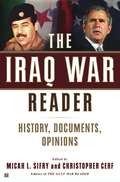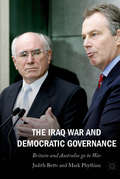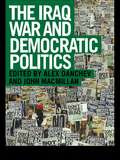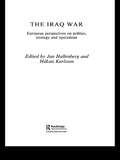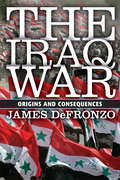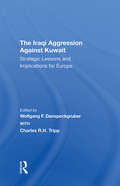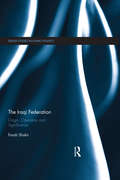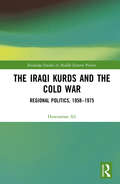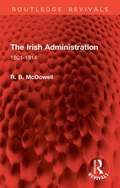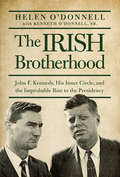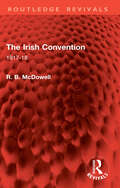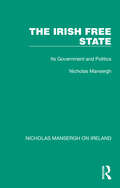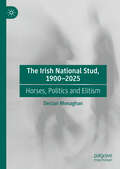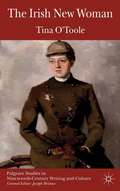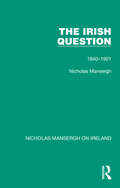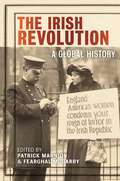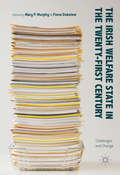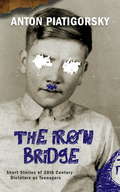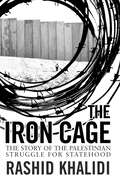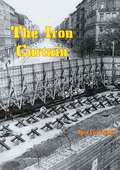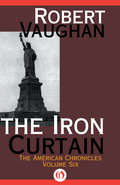- Table View
- List View
The Iranian Time Bomb: The Mullah Zealots' Quest for Destruction
by Michael LedeenThe War Against the Terror Masters is a must-read guide to the terrorist crisis. Michael A. Ledeen explains in startling detail how and why the United States was so unprepared for the September 11th catastrophe; the nature of the terror network we are fighting--including the state sponsors of that network; the role of radical Islam; and the enemy collaboration of some of our traditional Middle Eastern "allies";--and, most convincingly, what we must do to win the war.The War Against the Terror Masters examines the two sides of the war: the rise of the international terror network, and the past and current efforts of our intelligence services to destroy the terror masters in the U.S. and overseas. Ledeen's new book also visits every country in the Near East and describes the terrorist cancers in each. Among many revelations that will attract wide attention: *How the terror network survived the loss of its main sponsor, the Soviet Union. *How the FBI learned from a KGB defector--twenty years before Osama's bin Laden's murderous assault--of the existance of Arab terrorist sleeper networks inside the United States. *How moralistic guidelines straight-jacketed the FBI from even collecting a file of newspaper clippings on known terror groups operating in America. *How the internal culture of the CIA, and severe limitations on its ability to operate, blinded us to the growth of terror networks. And much more.
The Iraq Study Group Report
by Sandra Day O'Connor Lee H. Hamilton Lawrence S. Eagleburger Leon E. Panetta William J. Perry Charles S. Robb Alan K. Simpson James A. Baker III Vernon E. Jordan Jr. Edwin Meese IIIThe findings and proposals for improving security, strengthening the new Iraqi government, rebuilding its economy, and maintaining stability in the region.
The Iraq Study Group Report
by Lee H. Hamilton James A. Baker The Iraq Study GroupOn March 15, 2006, members from both parties in Congress supported the creation of the bipartisan Iraq Study Group to review the situation on the ground and propose strategies for the way forward. For more than eight months, the Study Group met with military officers, regional experts, academics, journalists, and high-level government officials from America and abroad. Participants included George W. Bush and members of his cabinet; Bill Clinton; Jalal Talaba Nouri Kamal al-Maliki; Generals John Abizaid, George Casey, and Anthony Zin Colin Powell; Thomas Friedman; George Packer; and many others. This official edition contains the Group's findings and proposals for improving security, strengthening the new government, rebuilding the economy and infrastructure, and maintaining stability in the region. It is a highly anticipated and essential step forward for Iraq, America, and the world. A PORTION OF THE PROCEEDS FROM THE PURCHASE OF THIS BOOK WILL BE DONATED TO THE NATIONAL MILITARY FAMILY ASSOCIATION, WHICH SUPPORTS FAMILIES OF ALL RANKS AND SERVICES, INCLUDING THOSE OF THE DEPLOYED, WOUNDED, AND FALLEN.
The Iraq War
by Bassam RomayaThis book features a critique of key philosophical doctrines that dominate the Iraq war debate: just war theory, humanitarian intervention, democratic realism, and preventive war doctrine. The author evaluates each and develops a philosophical approach that offers a model for thinking through the philosophical dilemmas introduced by new wars.
The Iraq War Reader: History, Documents, Opinions
by Micah L. Sifry Christopher CerfDespite the torrent of coverage devoted to war with Iraq, woefully little attention has been paid to the history of the region, the policies that led to the conflict, and the daunting challenges that will confront America and the Middle East once the immediate crisis has ended. In this collection, Micah L. Sifry and Christopher Cerf, coeditors of the acclaimed Gulf War Reader, have assembled essays and documents that present an eminently readable, up-to-the-moment guide -- from every imaginable perspective -- to the continuing crisis in the Gulf and Middle East. Here, in analysis and commentary from some of the world's leading writers and opinion makers -- and in the words of the key participants themselves -- is the engrossing saga of how oil economics, power politics, dreams of empire, nationalist yearnings, and religious fanaticism -- not to mention naked aggression, betrayal, and tragic miscalculation -- have conspired to bring us to the fateful collision of the West and the Arab world over Iraq. Contributors include: Fouad Ajami, George W. Bush, Richard Butler, John le Carré, Noam Chomsky, Ann Coulter, Thomas Friedman, Al Gore, Seymour Hersh, Christopher Hitchens, Arianna Huffington, Saddam Hussein, Terry Jones, Robert Kagan, Charles Krauthammer, William Kristol, Nicholas Lemann, Kanan Makiya, Kevin Phillips, Kenneth Pollack, Colin Powell, Condoleezza Rice, Arundhati Roy, Edward Said, William Safire, Jonathan Schell, Susan Sontag, George Will.
The Iraq War and Democratic Governance: Britain and Australia go to War
by Mark Phythian Judith BettsThis book examines the decisions by Tony Blair and John Howard to take their nations into the 2003 Iraq War, and the questions these decisions raise about democratic governance. It also explores the significance of the US alliance in UK and Australian decision-making, and the process for taking a nation to war. Relying on primary government documents and interviews, and bringing together various strands of literature that have so far been discussed in isolation (including historical accounts, party politics, prime ministerial leadership and intelligence studies), the authors provide a comprehensive and original view on the various post-war inquiries conducted in the UK, Australia.
The Iraq War and Democratic Politics
by Alex Danchev John MacMillanThe Iraq War and Democratic Politics contains the work of leading scholars concerned with the political implications of the Iraq War and its relationship to and significance for democracy. The book shuns simplistic analysis and provides a nuanced and critical overview of this key moment in global politics. Subjects covered include:* the underlying moral and political issues raised by the war* US foreign policy and the Middle East* the fundamental dilemmas and contradictions of democratic intervention* how the war was perceived in the UK, EU and US* the challenges of creating democracy inside Iraq* the influential role of NGOs* the legitimacy of the war within international law* the relationship between democratic government and intelligence.
The Iraq War: European Perspectives on Politics, Strategy and Operations (Contemporary Security Studies)
by Jan Hallenberg Håkan KarlssonWe are living amidst the fallout of the most controversial conflict of our times. This book is a tough examination of how and why it was fought and of its continuing effects.This major new work contains analysis of the Iraq War from several different academic, as well as military perspectives. Its emphasis is on the links between US foreign policy, US strategy and the US conduct of war and it also covers Iraqi grand strategies, the consequences of the War for transatlantic relations, and includes a chapter on the International Law dimension. In scrutinzing the war and the behaviour of its main parties, the editors draw upon international relations, political science, strategic thought and military theory, plus international law and media studies. For those wishing to understand the Iraq war from a very wide range of rigorous perspectives, this is a must-read.
The Iraq War: Origins and Consequences
by James DeFronzoThis book explains why the Iraq War took place, and the war's impacts on Iraq, the United States, the Middle East, and other nations around the world. It explores conflict's potential consequences for future rationales for war, foreign policy, the United Nations, and international law and justice.
The Iraqi Aggression Against Kuwait: Strategic Lessons And Implications For Europe
by Charles Tripp Wolfgang F. DanspeckgruberThe war for the liberation of Kuwait following the Iraqi invasion in 1990 rekindled the international community's geopolitical interest in the Gulf and helped define a new regional order. This book analyzes the political, strategic, and economic dimensions of the second Gulf War, with particular focus on military aspects. An international roster of experts treats issues of strategy, weapons technology, arms transfers, and the impact on the Arab state system. Of special interest is the exploration of the implications of the war for Japan, Germany, Russia, and Europe.
The Iraqi Federation: Origin, Operation and Significance (Exeter Studies in Ethno Politics)
by Farah ShakirPolitical instability has characterised the modern history of Iraq, which has proven itself as a complex state to govern. However, the creation of a federal system in 2005 offers the potential for change and a deviation from a past characterised by authoritarian government, brutality and war. The Iraqi Federation explores why and how Iraq became a federal state, and analyses how the process of formation impacts on the operation of the Iraqi federal system. It argues that the different approaches taken by various federal theorists in the past, particularly William H. Riker’s bargain theory, are insufficient to explain the formation of the Iraqi federation completely. The process of the establishment of a federal Iraq must be understood in the context of its unique history and cultural specificity, as well as in the context of the other new federal models that have appeared since the end of the Cold War, including Belgium, the Russian Federation, Ethiopia, Bosnia and Herzegovina and Nigeria. Drawing on interviews with contemporary political players in Iraq, this book helps to deepen our understanding of how one of the newest federal states operates in a practical sense. By linking the new federal models to the classic federal theory, it also provides a unique contribution to theories on federal state formation. It will therefore be of great interest to students and scholars of Middle East Politics, as well as those studying Federalism.
The Iraqi Kurds and the Cold War: Regional Politics, 1958–1975 (Routledge Studies in Middle Eastern Politics)
by Hawraman AliExamining the effects of the Cold War and regional politics on the Iraqi Kurds between 1958 and 1975, this study demonstrates how regional and international powers sought to exploit the Iraqi Kurds in their quest for statehood. The research draws on a plethora of British and American archival documents and select Soviet and Iranian sources integrated with Kurdish authoritative and eyewitness accounts. The work explores the Iraqi Kurds on three levels: Firstly, on a national Iraqi level, starting with the Iraqi Revolution in 1958 to the collapse of the Kurds’ liberation movement in 1975 under Mela Mustafa Barzani. Secondly, it considers the issue on a regional level by examining the political dynamics between Iran (under the Shah), Iraq, Egypt (thus Nasserists) and other regional states, with a focus on these states’ relations and tensions. Thirdly, it scrutinises the impact of the Cold War on the politics and history of Iraq, focussing on the effects on the Kurds in particular. Complementing the existing literature, this volume builds a chronological narrative through historical analysis. It is a key resource for students, scholars, policymakers and regional experts interested in Kurdish history, foreign policy, politics and security in the Middle East.
The Irish Administration: 1801-1914 (Routledge Revivals)
by R. B. McDowellThe developments and achievements of the Irish administration, overshadowed by the more spectacular aspects of Irish history have received comparatively little attention. But Irish conditions in the 19th Century encouraged and compelled the state to exert itself on a more extensive front than in contemporary England and a number of government departments played a very active and often creative part in Irish social and economic life. In this work, originally published in 1964, and based on a wide range of printed and manuscript sources, the author shows how the administrative structure was drastically rationalised and modernised. The author is also interested both in the work the administration performed and the men who staffed it. The Irish administration during the century came into contact with many different aspects of Irish society.
The Irish Brotherhood: John F. Kennedy, His Inner Circle and the Improbable Rise to the Presidency
by Helen O'DonnellThe Irish Brotherhood is the history of Jack Kennedy's original political inner circle. Led by Bobby Kennedy, Kenny O'Donnell, Larry O'Brien, and Dave Powers they were tough minded, Irish-Catholic guys who were joined together by a common ambition to see Jack Kennedy through to the White House. War veterans who were young, ambitious, and they wanted their country back. Jack Kennedy was their man, their leader. No matter that he was Irish, Catholic, and his "Old Man" had made as many enemies as friends - Jack had ambition, brains, a special charisma. To win the White House would be a victory not only for Jack Kennedy, but for the downtrodden. They collectively decided that if the political powers would not let them in willingly then they would kick the door down. At the center of the story is Kenny O'Donnell, Jack Kennedy's tough talking, no-bullshit, top political aide. Jack recognized he needed Kenny's blue collar, political genius and Kenny recognized something special in Jack.The Irish Brotherhood describes what it was like to be inside the Kennedy inner circle. With Bobby, who was determined to make his own mark apart from his famous family, his life-long struggle, never won, never lost. With Joe, as Kenny and Larry prove to him that their outsider approach was going to work after Jack's crushing victory in '58, which sets the stage for the Presidential campaign to come. This book is a missing piece of the story of the improbable rise to power of John F. Kennedy and further fills out the picture of the man revealing that Jack Kennedy was at heart a politician. He enjoyed the rough and tumble and despite his personal issues, or perhaps because of them, he became determined to succeed beyond anybody's expectations. It is intriguing an indelible portrait of the son, brother, friend, Congressman, Senator and President.
The Irish Convention: 1917-18 (Routledge Revivals)
by R. B. McDowellAlthough largely regarded as a failure, the Irish Convention of 1917, might, had it been successful, have resulted in a totally different Ireland to the one which has emerged. It was an attempt to solve the apparently intractable Irish Question. This book, originally published in 1970, describes the debates which took place. These debates provide an anthology of Irish political thinking, and the committee proceedings offer interesting examples of negotiating techniques, Lloyd George intervening with consummate skill. The author concludes that the Convention may be dismissed as a failure, but that its work formed a stage in the evolution of the Irish settlement of the early 1920s.
The Irish Free State: Its Government and Politics
by Nicholas ManserghOriginally published in 1936, this book provides an accurate and critical analysis of government in the Irish Free State, its principles, structure, philosophy and direction. It discusses clearly and impartially not only the failure of the Treaty settlement but also the electoral system, the legislature, the increase of executive power and the growth of administrative law and justice.
The Irish National Stud, 1900-2025: Horses, Politics and Elitism
by Declan MonaghanThis book examines the history of a pioneering Thoroughbred horse breeding operation, the Irish National Stud. By incorporating and integrating a diverse array of primary sources from various repositories and supplementing them with contemporary and secondary materials, the main narrative reveals the intricate details of Ireland&’s complex relationship with Britain through sport and politics. The publication adopts a chronological, thematic approach, beginning at the turn of the nineteenth century and tracing the development of the Stud through the twentieth century and into the twenty-first century. This book encompasses the political, cultural, and social dimensions of horse breeding/racing and the role of what would become the Irish National Stud. The first period of its history covers the establishment of Tully Stud in Kildare under Colonel William Hall-Walker in 1900. The second period, from 1916 to 1944, begins with Hall-Walker &‘gifting&’ Tully Stud to the British government, which then rebranded it as the &‘National Stud&’. This coincided with the Irish independence struggle and the formation of the new Irish Free State, leading to over two decades of deadlock over which government—Irish or British—legally owned the Stud. The third period saw the progression of the new Irish National Stud, from its creation in 1944 to the present day, offering a comparison with the British National Stud and providing a thorough analysis of the influence of elite Thoroughbred breeders on the Irish National Stud and the broader industry in both Ireland and Great Britain.
The Irish New Woman (Palgrave Studies in Nineteenth-Century Writing and Culture)
by Tina O’TooleThe Irish New Woman explores the textual and ideological connections between feminist, nationalist and anti-imperialist writing and political activism at the fin de siècle. This is the first study which foregrounds the Irish and New Woman contexts, effecting a paradigm shift in the critical reception of fin de siècle writers and their work.
The Irish Question: 1840-1921
by Nicholas ManserghOriginally published in 1940 but here reissuing the revised third edition of 1975, this book analyses the Irish Question. The study is not a narrative history. While the problems with which it deals have been suggested by the period it covers, it is with the problems and not the period that it is focussed on. Those problems are: the interrelation of economic and social with political forces; the impact of Irish discontent on the Liberal conversion to Home Rule; the character of the political, cultural and social forces behind revolutionary Irish nationalism; and the changing nature of the concept itself. Much attention is given to the implications of Anglo-Irish relations in the wider context of nationalist-imperial conflicts and critical studies are made of the writings of de Tocqueville, Cavour, Marx, Engels and Lenin among others on the Irish Question.
The Irish Revolution: A Global History (The Glucksman Irish Diaspora Series #3)
by Patrick Mannion Fearghal McGarryHow the Irish Revolution was shaped by international actors and events The Irish War of Independence is often understood as the culmination of centuries of political unrest between Ireland and the English. However, the conflict also has a vitally important yet vastly understudied international dimension. The Irish Revolution: A Global History reassesses the conflict as an inherently transnational event, examining how circumstances and individuals abroad shaped the course Ireland’s struggle for independence.Bringing together leading international scholars of modern Ireland, its diaspora, and the British Empire, this volume discusses the Irish revolution in a truly global sense. The text situates the conflict in the wider context of the international flourishing of anti-colonial movements following World War I. Despite the differences between these movements, their proponents communicated extensively with each other, learning from and engaging with other revolutionaries in anti-imperial metropoles such as Paris, London, and New York. The contributors to this volume argue that Irish nationalists at home and abroad were intimately involved in this exchange, from mobilizing Ireland’s vast diaspora in support of Irish independence to engaging directly with radical causes elsewhere. The Irish Revolution is a vital work for all those interested in Irish history, providing a new understanding of Ireland’s place in the evolving postwar world.
The Irish Welfare State in the Twenty-First Century
by Mary P. Murphy Fiona DukelowThis book provides a critical and theoretically-informed assessment of the nature and types of structural change occurring in the Irish welfare state in the context of the 2008 economic crisis. Its overarching framework for conceptualising and analysing welfare state change and its political, economic and social implications is based around four crucial questions, namely what welfare is for, who delivers welfare, who pays for welfare, and who benefits. Over the course of ten chapters, the authors examine the answers as they relate to social protection, labour market activation, pensions, finance, water, early child education and care, health, housing and corporate welfare. They also innovatively address the impact of crisis on the welfare state in Northern Ireland. The result is to isolate key drivers of structural welfare reform, and assess how globalisation, financialisation, neo-liberalisation, privatisation, marketisation and new public management have deepened and diversified their impact on the post-crisis Irish welfare state. This in-depth analysis will appeal to sociologists, economists, political scientists and welfare state practitioners interested in the Irish welfare state and more generally in the analysis of welfare state change.
The Iron Bridge
by Anton PiatigorskyThe Iron Bridge delivers an inspired inquiry into the early lives of the 20th century's most notorious tyrants. Anton Piatigorsky pushes at the boundaries of the unexpected as he breathes fictionalized life into the adolescents who would grow up to become the most brutal dictators the world has ever known.We discover a teenaged Mao Tse-Tung refusing an arranged marriage; Idi Amin cooking for the British Army; Stalin living in a seminary; and a melodramatic young Adolf Hitler dreaming of vast architectural achievements. Pol Pot and Rafael Trujillo are also subjects of separate stories. Piatigorsky explores moments that are nothing more than vague incidents in the biographies of these men, expanding mere footnotes into entire realities. The Iron Bridge, completely imagined yet captivatingly real, captures those crucial instants in time that may well have helped to deliver some of the most infamous leaders in history.From the Trade Paperback edition.
The Iron Cage: The Story of the Palestinian Struggle for Statehood
by Rashid KhalidiA brilliant and sobering critique of the Palestinian failure to achieve statehood, by a major Palestinian historian and political commentatorAt a time when a lasting peace between Palestinians and Israelis seems virtually unattainable, understanding the roots of the longest-running conflict in the Middle East is an essential step in restoring hope to the region. In "The Iron Cage", Rashid Khalidi, one of the most respected historians and political observers of the Middle East, examines the Palestinian's struggle for statehood, presenting a succinct and insightful history of the people and their leadership throughout the twentieth century. Ranging from the Palestinian struggle against colonial rule and the establishment of the State of Israel, through the eras of the PLO, the Palestinian Authority, and Hamas, this is an unflinching and sobering critique of the Palestinian failure to achieve statehood, as well as a balanced account of the odds ranged against them. Lucid yet challenging, Rashid Khalidi's engrossing narrative of this tortuous history is required reading for anyone concerned about peace in the Middle East.
The Iron Curtain
by Igor GouzenkoOriginally published in 1948, this book is the autobiographical account of the cipher clerk Igor Gouzenko who defected from the Russian Embassy in Ottawa on 5 September 1945, just three days after war end. In doing so he alerted the Canadian, British and American authorities to the spy rings operating in Canada which were made up of traitorous intellectual professionals and men who belonged to the social and academic establishment of Canada, confirming what Elizabeth Bentley and Whittaker Chambers were telling the FBI in the late 1940's about spy rings in the USA.A profound and gripping story of one "little man" risking his life for the greater good of protecting the heritage of freedom that many others take for granted.."We have been impressed with the sincerity of the man, and with the manner in which he gave his evidence, which we have no hesitation in accepting...."In our opinion Gouzenko by what he has done has rendered great public service to the people of this country, and thereby has placed Canada in his debt."--The Report of the Royal Commission to investigate the facts relating to and the circumstances surrounding the communication, by public officials and other persons in positions of trust of secret and confidential information to agents of a foreign power. June 27, 1946.
The Iron Curtain
by Robert VaughanVolume Six of Robert Vaughan's AMERICAN CHRONICLES begins with the emergence of a new America from the fiery furor of World War II, an America ready and eager to grasp the future. But the country cannot escape the shadows of the past horrors nor the obligation to the brave souls who fought for liberty and peace. As the defeated Germany faces her fate at Nuremberg and a Red scare makes its mark in every household, stories of courage, celebration, and the realization of destinies take place. Holocaust survivor Anna Gelbman heads off to Palestine to fight for a new homeland and to search for a daughter she hopes is still alive. Black pilot and war hero Travis Jackson's homecoming to Mississippi results in another battle, this time for equality. Award-winning war correspondent Shaylin McKay faces up to her devastating dread of love and loss after watching two men succumb to the terrors of war. Gifted Hollywood director Guy Colby, branded a Communist, sees his dreams fade as the witch-hunt continues.
